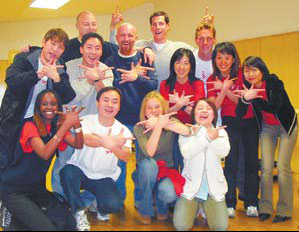"Many of the students from South Korea weren't that interested and weren't very good students. Now we have a big pool of students to choose from. We are able to select only the best ones and we have noticed their attitude to be getting better and better."
 |
|
Chinese teacher Zhao Changzheng (front, second from left) with his students from all over the world. Courtesy of Zhao Changzheng
|
Courses last one semester, though students can apply to stay on longer. At the start of each semester, students are tested on their oral Chinese and put into the 34 classes, each with around 15 students, according to their results. There are also 34 parallel classes in vocabulary, grammar and script.
It may come as a surprise, but studying Chinese characters is a compulsory component of the program. For Zhao, this is essential. "If you don't study the characters you can't really know our language and our culture," he says. "The best students are also taught about Chinese society, culture, economics and law, and we find they are very interested in these extra subjects."
The rewards are mutual. "I am their teacher but also their student too, sometimes. Just as it is a culture shock for students coming here from Europe and America, so it is for us at the university. The students tell me things I never knew and I learn from them all the time, so life is much more interesting."
While Zhao is reluctant to guesstimate how well students can expect to speak after just one semester, he says the sky is the limit.
"We once had a student who spent one year in China - 6 months with us and 6 months in Shanghai - and at the end of the year he spoke Chinese very, very well," he says.
Usually, though, he reckons you'd need to study full-time for 2-3 years before you are likely to speak with any fluency.
If students need to work hard to achieve their dreams, the same is true for 110-year-old Peking University, which is constantly reviewing its course structures to cater to the ever-changing student roll.
"Having so many Americans and Europeans here spreads the word about Peking University around the world," says Zhao.
"This is already the best university in China but we want more. We want to be the best, most famous university in the world. That has been our dream for a long time."
"Bah, humbug!" I thought. Then I surfed the Net and discovered the Times Higher Education Supplement, published in London, rated Peking University the best in Asia in 2006 and the 14th best in the world. Maybe it isn't an impossible dream.
(China Daily September 5, 2008)